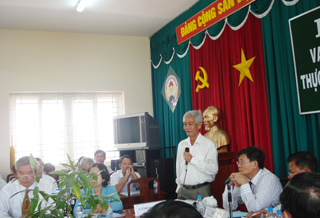Seminar on public credit funds’ role and implementing the 7th meeting resolution of the Central Party Committee.
Posted Date: 20/07/2011
On the morning of March 30, Alliance of the provincial cooperatives collaborated with the State bank of Vietnam (Dong Nai branch) in organizing a seminar on public credit funds’ role in implementing the 7th meeting resolution of the Central Party Committee. The seminar was attended by the comrades: Le Hong Phuong – Standing Deputy General of the provincial Party Committee, Nguyen Thi Kim Lien – Chairwoman of the provincial Fatherland Front Committee, Ao Van Thinh – Vice chairman of the provincial People’s Committee, Quach Anh Bong - Vice president of the State Bank of Vietnam (Dong Nai branch).
HTML clipboard
 |
|
Deputy
General of the provincial Party Committee – Le Hong Phuong delivered
a speech at the seminar |
After 15
years, since the government’s Prime Minister allowed setting up public credit
funds, there have been 30 funds (including 27 that are operating and 3 that have
obtained permits but haven’t operated) in Dong Nai province. In 2008, raising
and lending interest rates fluctuated, so public credit funds encountered
considerable difficulties. However, until late 2008 the raised capital of public
credit funds reached VND420.8 billion (up 268% compared with 2003) and made
their 19,247 members loans. Most ideas put forward at the seminar showed that
the model of public credit funds had increasingly developed in both quality and
quantity. The operations of public credit funds have contributed to promoting
the growth of the agricultural and rural economy, bringing about economic
structure shifts, generating employment and limiting high-interest and unsecured
loan offerings in rural areas. The representatives of public credit funds
reported the difficulties and obstacles in the process of carrying out their
tasks at the seminar.
Standing
Deputy Secretary of the provincial Party Committee – Le Hong Phuong delivered an
address at the seminar and reminded that public credit funds had to determine
who their clients were and what their guidelines were… and the most important
thing was how to create a stable life for low-income people.
(Reported by Thanh Tam,
Translated by Duy Minh)